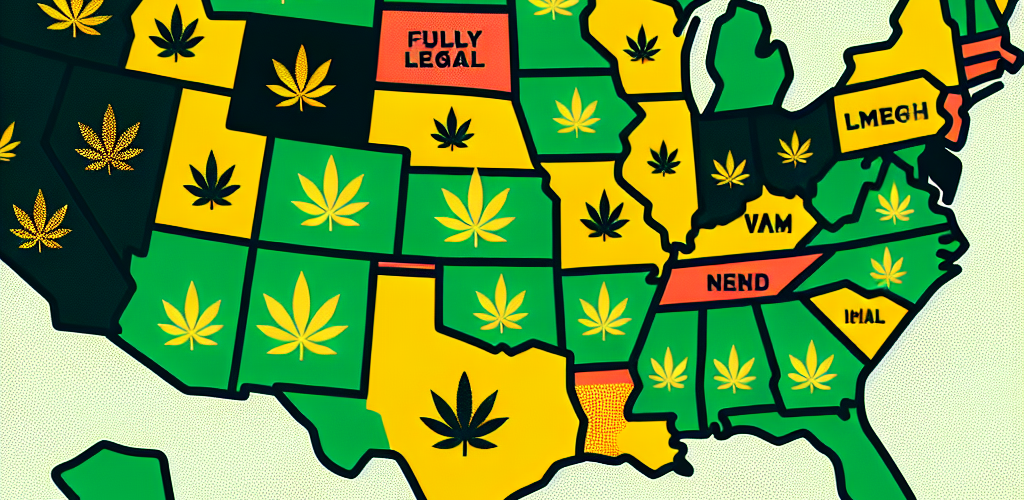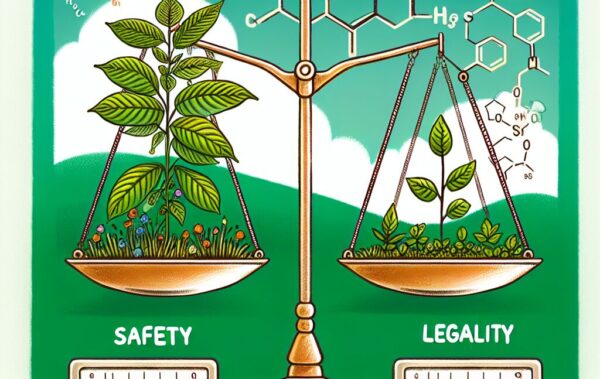- Overview of Kratom and its legal status
- States where Kratom is fully legal
- States with regulated Kratom use
- States where Kratom is banned
- F.A.Q. about Kratom’s legality
Kratom, a tropical tree native to Southeast Asia, has gained increasing attention and popularity in recent years for its potential effects, which some users describe as stimulating in low doses and sedating in higher doses. As a result of such properties, kratom has been utilized by numerous individuals for various purposes, including managing discomfort, enhancing energy levels, or promoting relaxation.
Given kratom’s complex pharmacology and perceived benefits, its regulation has become a topic of critical relevance across the United States. As kratom is not currently regulated federally by the Drug Enforcement Administration (DEA), the responsibility for legislating and enforcing kratom-related laws falls to individual states and local jurisdictions. This decentralized approach has led to a patchwork quilt of regulations, creating a landscape where kratom’s legality can vary drastically from one state to another.
The FDA has issued warnings concerning the use of kratom, citing potential safety issues and the need for further research. However, these federal advisories have not translated into a uniform national ban, and the legality of kratom remains a state-specific concern. Enthusiasts of the plant argue for its continued availability and the importance of informed usage, highlighting the significance of public education over prohibition.
Anyone looking for a comprehensive legal analysis should recognize that state policies can be fluid, and shifts in kratom’s legal status may occur over time. For those interested in exploring kratom products while being mindful of the law, websites like Kratom.Markets offer a variety of kratom goods that cater to legally permissive states.
Understanding the intricate nuances of Kratom legality calls for a meticulous state by state analysis. Such scrutiny ensures that both kratom users and vendors operate within the boundaries of the law, maintaining compliance and avoiding potential legal ramifications.
In the upcoming sections, we will delve into the specific legal statues state by state, providing a clearer picture of where kratom is fully legal, where its use is regulated, and where it faces prohibitions. For those interested in kratom’s diverse product range such as powders, capsules, and extracts, discerning one’s local laws is essential, and options like kratom powder can be pursued in states with favorable legal standing.
In summary, the legal panorama for kratom in the United States is as varied and nuanced as the plant’s effects. A responsible user or vendor must understand this evolving regulatory environment to ensure they make informed decisions that respect the state-specific Kratom laws.
States where Kratom is fully legal
In the United States, the discussion around Kratom legality is not painted in broad strokes; instead, it navigates through a patchwork of laws that differ quite significantly from one state to another. For Kratom enthusiasts residing in or traveling through territories where Kratom is fully legal, such information is vital to maintaining a clear conscience while benefiting from this botanical’s offerings.
The states where Kratom is fully legal constitute regions where adults can purchase, possess, and consume Kratom products without restrictions specific to this plant. This freedom means that vendors, including both brick-and-mortar shops and online platforms, can openly market and sell a wide array of Kratom items—from leaves and powders to capsules and extracts—to consumers who are keen on exploring the benefits and experiences associated with Kratom.
In these states, there is typically no legislative push to classify Kratom alongside controlled substances, and for many, this is seen as a win for personal freedom and botanical advocacy. However, it’s important to note that “fully legal” does not mean unregulated. Many states have adopted the Kratom Consumer Protection Act (KCPA), which aims to keep Kratom users safe by ensuring the products available are pure, unadulterated, and properly labeled with accurate potency information.
The conditions of full legality often come with the understanding that the state has acknowledged Kratom as a product that, when sold responsibly, poses no significant risk to public health and safety. Most users in these areas enjoy the privilege of exploring the different strains of Kratom, such as the invigorating Maeng Da, the balanced Bali, and the sedating strains of Borneo and Indo varieties. It empowers them to make informed choices about dosing and consumption methods, based on preference or the outcome they desire—whether it be pain relief, help with sleep disorders, management of anxiety, or simply a desire for better focus and energy.
To ensure that you’re getting your Kratom from a reliable source within fully legal states, turning to credible platforms like Kratom.Markets ensures that not only are you within your legal right, but you also have access to a plethora of product options that cater to different needs, be it for relaxation with a Kratom tea bag or for a quick, potent dose in the form of Kratom shots.
The reassurance that comes from existing in a state where Kratom is fully legal cannot be overstated. For the discerning user, it translates to an ease of access and peace of mind that allows them to enjoy the potential benefits of Kratom without the looming threat of legal repercussion. It’s a testament to the state-by-state analysis of Kratom laws that some regions recognize the importance of preserving individual rights to choose natural botanicals for personal use.
Navigating the landscape of Kratom legality state by state helps to underscore the dynamic nature of this legal analysis. Users and vendors alike must keep abreast of the latest developments to ensure full compliance with the law while advocating for their right to access and utilize Kratom responsibly.
States with regulated Kratom use
In examining the intricate edges of the United States’ Kratom legality map, it becomes evident that there’s a middle ground between fully legal and outright banned—states with regulated Kratom use. These are areas where Kratom legality is subjected to limitations and restrictions, making a state by state analysis not only helpful but necessary for anyone involved with this herbal substance.
In these states, regulations often take the shape of age restrictions, labeling requirements, licensing for vendors, and limitations on the types of Kratom products that can be sold. For instance, some states might prohibit the sale of Kratom-infused edibles while allowing powders and capsules. Speaking of regulations, it’s worth noting that products like Kratom powder and Kratom capsules may be available but could come with disclaimers and must meet quality standards set forth by the state.
- Age Restrictions: Most regulated states require that individuals be 18 years or older to purchase Kratom. This is to ensure that minors are not accessing a substance that could be potentially misused or harmful without proper guidance.
- Labeling Requirements: Vendors in these states may be required to clearly label their Kratom products, indicating what is in the product, its strength, and often a batch or lot number for traceability.
- Licensing and Standards: States may demand that vendors acquire specific licenses to sell Kratom. Together with these licenses, there might be product testing requirements to verify purity and absence of contaminants before Kratom products hit the market.
- Type Restriction: Some states may allow the sale of certain types of Kratom products over others. For example, raw leaf might be permissible while concentrated extracts are not.
The goal of these restrictions is frequently to promote consumer safety and ensure proper use without criminalization. It recognizes that while Kratom might be beneficial for many, it should be respected like any substance with potential effects on the mind and body. Therefore, the legal analysis becomes invariably nuanced, as different jurisdictions approach the regulation of Kratom with varied intensity and focus.
In this turf of regulated Kratom use, the legal analysis demands vigilance and an up-to-date understanding of the ever-shifting legal landscape. For those within these states or considering visiting, it’s critical to know the specifics to stay on the right side of the law.
As this conversation rolls forward, we connect the dots between freedom of use and responsibility. Being an informed consumer or vendor is more than a suggestion—it is a requirement to navigate the complex web of Kratom laws. And for those looking to engage with Kratom in these regulated areas, retailers like Kratom.Markets can provide the legal products along with detailed information to ensure consumers stay informed and compliant.
Recognizing the patchwork nature of these regulations—underscored by the well-being of the public—underscores the need for a thoughtful approach to Kratom legality. It’s a balancing act between individual freedoms and the collective good, hence calling for a comprehensive, state by state analysis of the laws that govern this unique plant.
States where Kratom is banned
Despite its popularity and the deep dive into kratom’s regulated states, there exists a sobering reality in some corners of the United States where kratom is unequivocally banned. The legal analysis of kratom becomes more stringent as we survey these areas, identifying states where authorities have taken a firm stance against the substance.
In such regions, kratom’s availability is nil, not due to a lack of demand, but because state legislation prohibits its sale, possession, and use. This means that any attempt to either distribute or procure kratom within these jurisdictions is met with legal consequences that can range from fines to, in some cases, criminal charges. It is of utmost importance for individuals within these states to abstain from participating in any kratom-related activities to avoid breaking the law.
Here is a breakdown of the states where kratom is currently banned, along with a glimpse into the specific kratom laws imposed:
| State | Details on Ban |
|---|---|
| Alabama | Banned since May 10, 2016; classified as a Schedule I controlled substance. |
| Arkansas | Added to the controlled substances list in February 2016. |
| Indiana | One of the first states to ban kratom, declaring it a synthetic drug. |
| Rhode Island | Directors of Health and Business Regulation banned kratom in 2017. |
| Vermont | Classified as a regulated hallucinogenic substance and a synthetic cannabinoid. |
| Wisconsin | Listed as a Schedule I controlled substance since 2014. |
Delving into the nuances of kratom legality and conducting a state by state analysis uncovers the complexities that define the United States’ stance on kratom. It’s a polarizing topic, with strong opinions and decisions backed by differing state laws and interpretations of kratom’s safety profile.
For those living in or traveling to the states mentioned above, the message is clear: engaging with kratom could lead to significant legal entanglements. Due to the bans, individuals interested in kratom must look beyond state lines, to places where laws are more permissive. In doing so, they must also remain vigilant, as transporting kratom across state boundaries into a region where it’s banned could carry repercussions.
Staying informed on the latest developments in kratom legality is essential. While websites like Kratom.Markets provide an array of products for those in legally permissible areas, understanding and abiding by the laws of one’s own state is crucial in maintaining a legal footing. Always ensure that your engagement with kratom remains within the scope of the law to avoid any possible infringements on your personal freedoms.
In conclusion, the acknowledgment of these bans and the legal analysis associated with kratom’s prohibited status in certain states are integral pieces of understanding the broader landscape of kratom laws in the U.S. It’s wise to take heed of the strict regulations, remain cognizant of shifting legal paradigms, and to always operate within the boundaries of your respective state’s stipulations.
F.A.Q. about Kratom’s legality
Confusion around kratom legality is not uncommon, given the various stances taken by states across the country. To clarify these concerns and provide valuable insights, we’ve compiled a set of frequently asked questions regarding the legal nuances of kratom.
Can I legally buy kratom in my state, and if so, what kinds of products are available?
The ability to purchase kratom and the types of products available, such as powders, capsules, and extracts, depend heavily on your state’s specific laws. In states where kratom is fully legal, you can choose from a wide range of products, like those offered on Kratom.Markets. However, in regulated states or those where kratom is banned, your options are severely limited or non-existent.
How do I stay updated on the legal status of kratom in my area?
Staying informed requires a proactive approach. You can do this by following kratom advocacy groups, legislative updates, and reputable kratom marketplaces that often provide updates on state-by-state legality. Websites that consolidate kratom options, like Kratom.Markets, may also offer guidance on navigating the evolving legal landscape.
What should I do if I travel to a state with different kratom laws?
Understanding the local laws is crucial when traveling. Carrying kratom into a state where it is banned can lead to legal problems. Before you travel, research the latest legal status of kratom in your destination and plan accordingly to avoid unintentionally breaking the law.
Is there a possibility of kratom’s legal status changing in my state?
Yes, kratom laws can and do change. Legislative bodies may introduce new laws, amend existing ones, or even reverse bans based on new research, public opinion, or advocacy efforts. Keeping a finger on the pulse of legislative trends within your state is vital.
Why is there so much variation in kratom legality from state to state?
The variation in state laws for kratom is a result of the U.S. federal system, which allows states to enact their own legislation on matters not federally controlled. Different states may interpret the research and societal impact of kratom differently, leading to a range of legal standings.
By addressing these frequently asked questions on Kratom.Markets, we hope to provide a clearer understanding of the complex, evolving field of kratom legality. Engaging with kratom within the law requires a well-informed, state by state analysis to ensure that you’re not inadvertently stepping outside legal boundaries. Whether you’re a seasoned kratom enthusiast or new to the community, learning about kratom laws remains a priority for responsible use and advocacy.









